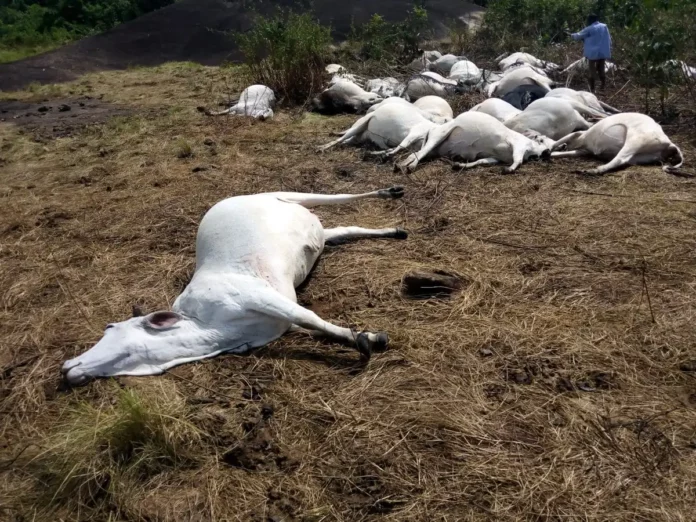Benue State is once again facing increased tension following fresh attacks on Fulani herders and the killing of hundreds of cattle in Gwer West and Guma Local Government Areas. The incidents, which occurred on November 12, have raised fears of retaliatory violence in a region already sensitive to conflict between farming communities and pastoral groups.
According to accounts from herders and community sources, heavily armed men—allegedly linked to local security outfits—launched coordinated assaults on pastoral settlements in the two LGAs. The attacks resulted in the deaths of an estimated 259 cattle in separate locations on the same day. The killings have sparked outrage among herder associations and concern among residents who fear another round of clashes if the matter is not quickly addressed by security agencies.
The first incident was reported near Naka, the headquarters of Gwer West LGA. Eyewitnesses said groups of armed men riding motorcycles and vehicles stormed a grazing area where herders were tending to their cattle. The attackers allegedly belonged to government-backed local security units, though this has not been independently verified.
Herders affected in the attack gave detailed accounts of their losses. Abdullahi Musa said 50 of his cattle were killed in the ambush. Another herder, Wakili Musa, reported losing 51 animals. Maibargo Abubakar, the third victim identified, said 21 of his cattle were killed.
“They just came without any provocation,” one of the victims said. “We were grazing peacefully. Before we knew what was happening, they started shooting at the cattle.”
Witnesses also claimed that the attackers loaded several carcasses onto trucks and transported them into Naka town in broad daylight. The sight of armed men driving around with the carcasses reportedly caused fear and confusion among residents. Some community members described the scene as a “celebration,” which they believe was meant to provoke further ethnic tension.
One resident of Naka who witnessed the aftermath said, “This was not only about killing cattle; it was deliberate provocation. If nothing is done, it may lead to more violence.”
On the same day, another major assault was recorded behind Okohol village, near Ikpam in Guma LGA. Armed men were said to have attacked herders grazing in the area and killed 137 cattle belonging to Alhaji Anaruwa Yongo and his brother.
According to sources familiar with the situation, some of the carcasses were carried away by the attackers, while others were left scattered across the grazing fields. The brutality of the attack has caused fear among herders who now worry that the violence may spread to neighbouring communities.
The areas of Gwer West and Guma have seen similar clashes in recent years, often linked to disputes over land, grazing routes, and community security arrangements. Guma LGA, in particular, has been one of the hotspots of the farmer-herder conflict that has troubled Benue State for more than a decade.
The victims said military personnel deployed in the area visited some of the affected locations shortly after the attacks. The soldiers were reported to have inspected the scenes and confirmed the destruction of livestock. However, no official statement has been issued by the military regarding the identity of the attackers or the motive behind the assaults.
The killing of livestock on this scale is rare, even in the context of long-running tensions between herders and farming communities in Benue State. Cattle represent wealth, livelihood, and cultural identity for Fulani herders, and attacks of this nature often trigger strong emotional and economic responses.
Leaders of herder associations warn that such incidents can easily push communities into retaliatory violence, especially when no arrests are made and no investigations are publicly announced. They have called on both the state and federal governments to immediately intervene.
Community elders in Gwer West and Guma also expressed fear that the attacks may disrupt the fragile peace that the state has been working to maintain. One elder from a farming community noted, “Any attack—whether on farmers or herders—affects everyone. It creates mistrust. If this issue is not resolved quickly, we may see reprisals.”
Benue State has long been a flashpoint in Nigeria’s farmer-herder crisis. The passage of the 2017 Open Grazing Prohibition and Ranches Establishment Law, which banned open grazing in the state, led to deeper mistrust between pastoral groups and the state government. While the law was created to reduce clashes, its implementation contributed to new tensions, as many herders struggled to adjust to the restrictions.
The state has recorded several deadly incidents over the years, with both farmers and herders suffering loss of lives, property, and livestock. Though recent peace efforts helped reduce large-scale violence, the latest attacks threaten to reverse those gains.
As residents of Gwer West and Guma wait for official responses, the fear of renewed conflict looms large. Many families are keeping a close watch on developments, hoping that authorities can act swiftly to stop the situation from spiralling out of control.

